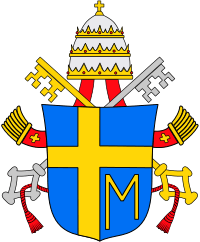Pastor Bonus
 |
| This article is part of a series on the |
| Roman Curia |
|---|
|
Secretariats |
|
Related topics |
Pastor Bonus ("Good Shepherd" in Latin) is an Apostolic Constitution promulgated by Pope John Paul II on 28 June 1988. It instituted a number of reforms in the process of running the central government of the Roman Catholic Church, as article 1 states "The Roman Curia is the complex of dicasteries and institutes which help the Roman Pontiff in the exercise of his supreme pastoral office for the good and service of the whole Church and of the particular Churches. It thus strengthens the unity of the faith and the communion of the people of God and promotes the mission proper to the Church in the world".
Background

Pastor Bonus laid out in considerable detail the organization of the Roman Curia, specifying precisely the names and composition of each dicastery, and enumerating which competencies, or responsibilities, each dicastery was charged with overseeing. It replaced the previous governing document, Regimini Ecclesiæ universæ, which was released by Paul VI in 1967.[1]
It delineated the roles of the Secretariat of State, Congregations, Tribunals, Pontifical Councils, Administrative Services and Pontifical Commissions of the Roman Curia. It also established the norms for the Ad limina visits of bishops to Rome and the relationship between the Holy See and the particular Churches and episcopal conferences.
Changes
Among the changes formulated in the constitution was the re-integration of the Council for Public Affairs of the Church into the Secretariat of State as the Section for Relations with States (the Second Section). The Council for Public Affairs of the Church had previously been a section of the Secretariat of State, but was made an independent dicastery by Pope Paul VI in 1967.[2]
The constitution also opened membership in dicasteries to priests, deacons, religious, and lay persons. For centuries, only cardinals were eligible for membership in the organs of the Holy See, but Pope Paul VI allowed diocesan bishops to be members following calls for collegiality at the Second Vatican Council. Pastor Bonus continued the opening of the central government of the church by allowing representatives of all the faithful to have a role in the Roman Curia.
Modifications
_and_Benedict_XVI._(2008).jpg)
In the Apostolic Letter Ministrorum institutio of 16 January 2013, Pope Benedict XVI transferred the governance of seminaries from the “Congregation for Catholic Education” to the “Congregation for the Clergy”.[3] On the same day the Apostolic Letter Fides per doctrinam transferred the competence of Catechesis from the “Congregation for Clergy” to the “Pontifical Council for Promoting New Evangelization”.[4]
In October 2013, Pope Francis and his Council of Cardinals were reviewing Pastor Bonus for possible further revisions.[5] On 24 February 2014, Pope Francis issued the Apostolic Letter Fidelis Dispensator et Prudens establishing the Council for the Economy as an entity having oversight for the administrative and financial structures and activities of the dicasteries of the Roman Curia, the institutions linked to the Holy See, and the Vatican City State. It also established a Secretariat for the Economy as a dicastery of the Roman Curia.[6]
References
- ↑ Akin, Jimmy. "Is Pope Francis about to “rip up” the Vatican constitution? 12 things to know and share", National Catholic Register, 2 October 2013
- ↑ "Secretariat of State: Profile". The Holy See. Retrieved 2007-04-23.
- ↑ Pope Benedict XVI, ''Ministrorum institutio, NEW.VA, 16 January 2013
- ↑ Pope Benedict XVI, Fides per doctrinam, NEWS.VA, 16 January 2013
- ↑ MacDonald, Sarah. "Council of Cardinals signals major changes to Pastor Bonus", CatholicIreland.net, October 4, 2013
- ↑ Pope Francis, ''Fidelis Dispensator et Prudens, Libreria Editrice Vaticana, 24 February 2014
External links
- Original text (Latin)
- Full text, translated to English by Francis C.C.F. Kelly, James H. Provost, and Michel Thériault and revised by Canadian Conference of Catholic Bishops and the Secretariat of State, and authorized by the Secretariat of State.
- Wooden, Cindy. "Changing needs, changing names: Reform of Curia is Vatican tradition", Catholic New Service, 13 July 2014
